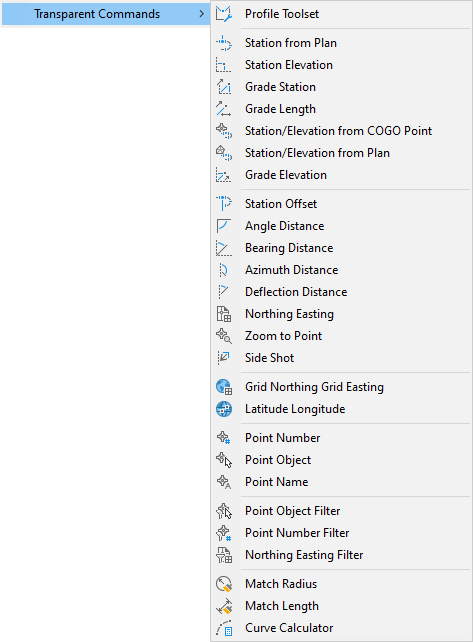Use Autodesk Civil 3D transparent commands to enter a value based on known information when you are prompted for a point, a distance, or a radius.
A transparent command can only be used within a running command.
You can run transparent commands from the Transparent ribbon tab, from the context menu, by using a toolbar, or by entering a command.
- Select the command from the
Transparent ribbon tab.

- Select the command from the
Transparent Commands context menu.

- Select the command from the
Transparent Commands toolbar.

- Enter the name of the transparent command at the command line. A transparent command always begins with an apostrophe (‘).
Most Autodesk Civil 3D transparent commands are used to specify point locations within a larger operation, such as the creation of an alignment or a parcel lot line. Using these transparent commands, you can calculate the location for a point from information, such as angle and distance, or from point object information, such as a point number.
When you enter a transparent command within a running command that accepts more than one point location (for example, the AutoCAD LINE command), you can enter a series of points in the same format without having to re-enter the transparent command. At any time, you can press Esc to terminate the transparent command and return control to the main command, where you can switch to another transparent command. Also, you can end the transparent command by terminating the main command.
Some of the Autodesk Civil 3D transparent commands require a Z coordinate for the point elevation. For more information, see About Transparent Command Settings.
Using Previously Entered Points in a Running Command for Relative Data Input
When you use a transparent command that requires baseline data from which to calculate a relative location, you must enter the required data before specifying the command parameters. If you use a transparent command within a running command, the transparent command remembers the last points entered during the running command and uses them to calculate new relative locations.
For example, when you use the Bearing Distance (‘BD) transparent command, you must first identify a baseline point from which the bearing and distance are measured. If you initiate the Bearing Distance command before you enter any points, you are prompted for the baseline point before you are prompted for quadrant, bearing, and distance. If you use the Bearing Distance command after you have entered at least one point, the last point you entered is used as the baseline.
Transparent Command Point Filters
When you are working within a transparent command and you are prompted to specify a point location, you can use point filters to specify known point information by doing one of the following:
- Entering a point number
- Entering northing and easting
- Selecting a point in a drawing
For more information, see About Using Point Filters Within Transparent Commands.